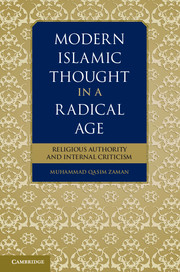Book contents
- Frontmatter
- Contents
- Acknowledgments
- A Note on Transliteration, Spelling, and Other Conventions
- Map
- 1 Introduction
- Part One
- Part Two
- 5 Bridging Traditions: Madrasas and their Internal Critics
- 6 Women, Law, and Society
- 7 Socioeconomic Justice
- 8 Denouncing Violence: The Ambiguities of a Discourse
- 9 Epilogue: The Paradoxes of Internal Criticism
- Bibliography
- Index
- References
5 - Bridging Traditions: Madrasas and their Internal Critics
Published online by Cambridge University Press: 05 November 2012
- Frontmatter
- Contents
- Acknowledgments
- A Note on Transliteration, Spelling, and Other Conventions
- Map
- 1 Introduction
- Part One
- Part Two
- 5 Bridging Traditions: Madrasas and their Internal Critics
- 6 Women, Law, and Society
- 7 Socioeconomic Justice
- 8 Denouncing Violence: The Ambiguities of a Discourse
- 9 Epilogue: The Paradoxes of Internal Criticism
- Bibliography
- Index
- References
Summary
Of the many debates on issues relating to “Islam and modernity,” questions of educational reform are among the thorniest. What sort of education should Muslims receive to meet the challenges of changing times and needs? Can “useful education” – usually understood to comprise the modern, secular, Western sciences – be combined with the traditional Islamic sciences and, if so, how and in what measure? How should Islam itself be reinterpreted to facilitate Muslim adaptation to modern institutions and practices? Such questions were repeatedly asked by Muslim modernists of the nineteenth and early twentieth centuries as a prelude to urging their coreligionists, as `Abdullah Yusuf `Ali (d. 1953) – a noted intellectual of colonial India best known for his English translation of the Qur'an – put it, “to make modern knowledge a living force among Muslims, as it was in their palmy days.” Similar concerns have continued to engage the modernizing governing elite of postcolonial Muslim societies as well. They have also figured in various ways in much Western commentary on madrasas and other institutions of traditional Islamic learning, frequently viewed as sites of illiberal indoctrination.
Prominent among those at the receiving end of such questions are, of course, the `ulama. In response, many among them have argued that the sort of virtues Muslims need to cultivate come from the Islamic religious tradition itself and not from the West; that only a return to the fundamentals of the faith would restore God's favor to them and empower them in adverse circumstances; and that efforts toward “mixing” the Islamic sciences with modern, Western forms of learning are aimed ultimately at undermining the `ulama's ability to impart authoritative Islamic learning and thus represent a thinly disguised attack on Islam itself. Assertions of this sort are easily caricatured, lending themselves to reinforcing the deep misgivings many observers have had about what the madrasa and its constructions of Islam might mean for the world around it.
- Type
- Chapter
- Information
- Modern Islamic Thought in a Radical AgeReligious Authority and Internal Criticism, pp. 143 - 175Publisher: Cambridge University PressPrint publication year: 2012
References
- 1
- Cited by



